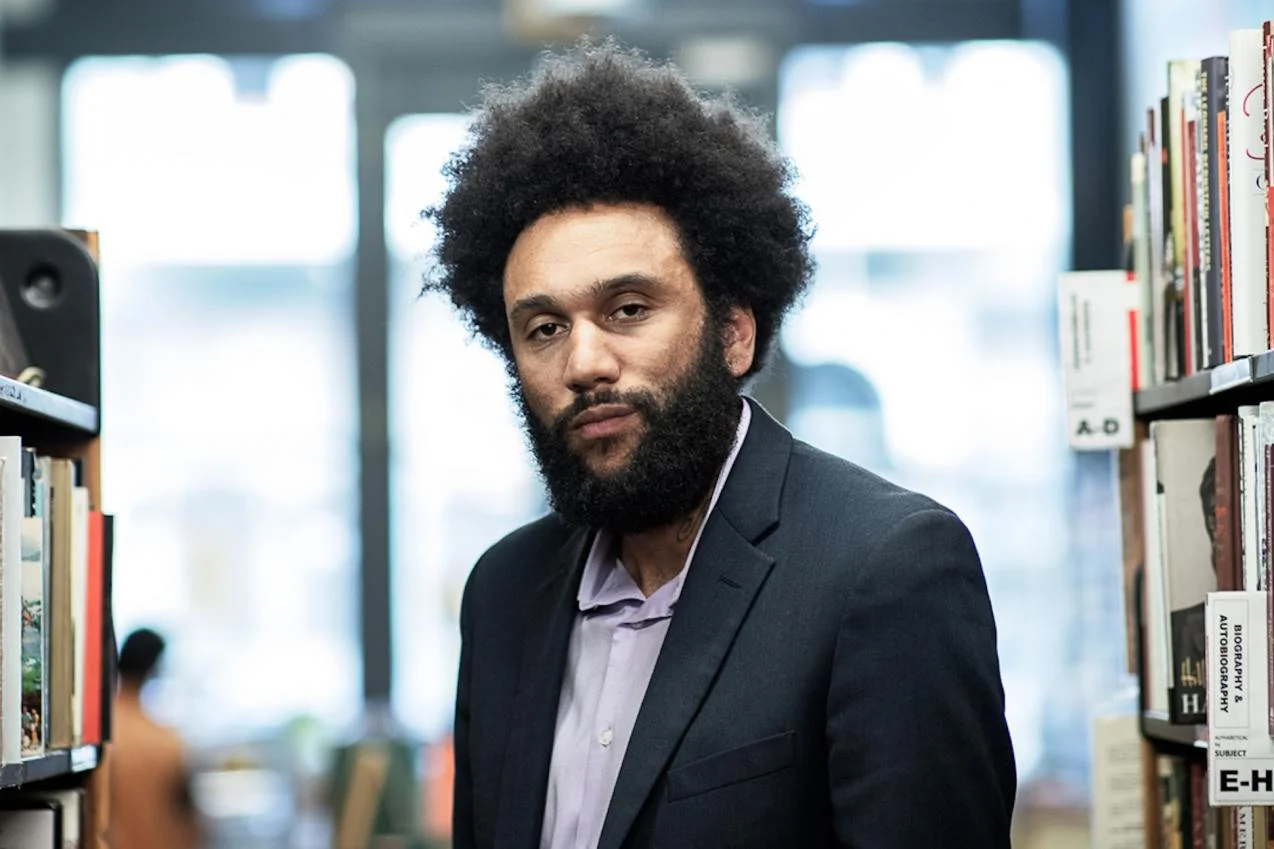In April, Adobe had the pleasure of hosting the duo ZNH, comprised of poet Tongo Eisen-Martin and musician Marshall Trammell, for a series of performances. Both Tongo and Marshall have an inspiring reputation nationally for spreading community-based social and political action through their art. Judging by the dynamism of their percussion-spoken word exchanges, the two could have spent hours in front of their audience, dishing out incendiary commentary, verbally and musically, on how America’s status quo of injustice pervades our day-to-day life. Yet, throughout the series, Tongo and Marshall also brought up a host of local poets to perform, demonstrating their enthusiasm for carving out space for the Bay Area’s wider community of poet-activists.
I was lucky enough to speak with Marshall and Tongo shortly after ZNH’s performance series wrapped up. Below is the first of the two separate interviews, a conversation with Marshall.
***
Jamie Aylward: In your performances in April at Adobe, you and Tongo [Eisen-Martin] had an almost telepathic seeming connection--in the way your playing went along with Tongo's poetry, and how you two responded to each other. How long have you been performing together? It is a regular thing, or only every now and then? Do you rehearse?
Marshall Trammell: Anthony Braxton used to say that when it comes to performance, you have to jump or die. Tongo and I first did a live session moments after we met in 2017, hence the dialogic nature of our conviviality-in-performance; hence trust-building.
One can’t rehearse revolutions. One has to arrive on the scene with barrels loaded and trained. I prepared by listening to videos of Tongo and sniffing out his community pedigree. Opportunities for us to hit again are already in motion, although through no action of our own directly, as far as I know. The forces in motion that brought us together are forever in circulation.
JA: Where did the name come from? Are there particular inspirations in mind for this duo format you two have been doing?
MT: Tongo wanted a name that was gangsta. ZNH (Zora Neale Hurston) loved on Black people like a gangsta. All up in everybody’s business. And for that she was abandoned.
JA: Stepping back in time a little bit, I was wondering what your earliest memories of engaging with the arts are?
MT: As children, play is serious. Creating and managing play shape our developing minds. Currently, I am drafting a reflection on the shape of Hawaiian-style football. I grew up in a small town on the island of Oahu. We played a combination of American-style football (hard scrimmage line, forward passes only) and rugby (soft scrimmage line, all manner of passes, but no punting). It’s a convivial dance that calls for creativity and discipline similar to forms of i/Improvisation that I experience in the a/Arts and practice today.
JA: Both poetry and music are marked down on a page in lines and books and sheet music. But they are also performed live for audiences. How do you think the impact of your music changes when it’s delivered in a live setting vs. when its recorded in a studio?
MT: I’ve never experienced Tongo read anything. We might have to try recording in a studio to answer the question scientifically. I only perform improvised music and non-improvised, folkloric musics. Improvisations are not re-settable, like not being able to step in the same river twice. Change, repetition, & difference are all embedded in the practice.
JA: How do you find performing with a poet different from performing with people playing instruments?
MT: Whether performing with Genny Lim or Saul Williams, audiences want to hear the words. Perhaps Ron Heglin is the only vocalist who didn’t mind when his utterances are washed over with sound. When supporting a poet, though, the ensemble wants to aid the audiences in receiving the transmission clearly and honestly and directly.
JA: On the face of it, you’re a musician and Tongo is a poet. Many musicians and poets stop there, in the sense that they make music and poems in the sectioned off little world of their mind. However, you two fuse your art practice with vital social and political action, not only in the content of your work, but in doing things like educating, organizing, and documenting. Is that simply instinctual for you? Like you can't have one (art) without the other (putting art into action to challenge prevailing power structures)? Or did you build up to it over time?
MT: What motivates me more than most are the tides of privileged colleagues who risk nothing to extract resources from oppressed creatives yet reap the benefits in the “star” economy and other neoliberal poetics. So many want the cream off the top. I am student of history and my own experiences. Chuck D said “Burn Hollywood”—that still makes sense to me.
JA: Could you give a brief overview of your Music Research Strategies project and antidisciplinarity.net?
MT: Music Research Strategies is platform or container for critical investigations. One of the goals has been to create an infrastructure to support a number of strategists to define a critical, Creative Improvised Music aligned to serve community-based organizations (CBOs). Displaced from the hub of the Bay for a number of reasons, the platform has evolved to support a tactical media lab strategy, Antidisciplinarity, as a public database or community archive featuring critical artists collaborations with CBOs. On my current tour, Status Quo Is My Enemy, I am documenting myowndamnself as a foundation.
JA: A lot has been said and written about the demise of the art/literary/music scene in SF as the city gets more expensive and becomes home to many who despise or have no need for radical arts. Are there things going on that make you optimistic for the artistic future of San Francisco?
MT: Allegra Madsen is providing good programming at the Bayview Opera House; the Curatorial Council at Southern [Exposure] continues with powerful programming, with special thanks to Valerie Imus and Jose Navarette; East Side Arts Alliance (Oakland) where I had a residency in April, 2019; Rick and Megan Prelinger hold down a residency space and private library for radical nerds.











